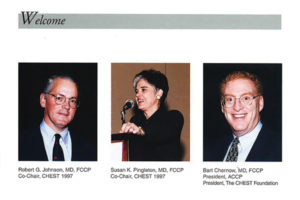 When the CHEST Annual Meeting convened in 1997, it would be 22 years until the meeting would return to vibrant New Orleans.
When the CHEST Annual Meeting convened in 1997, it would be 22 years until the meeting would return to vibrant New Orleans.
The city’s resiliency post-Katrina has restored its exuberant vibe and mystical allure, which has been charming visitors and natives for 300 years. Just as New Orleans has gone through its own transformations in the past 2 decades but held onto its roots, the CHEST Annual Meeting has evolved with the advancement of learning and medicine.
While flipping through the 1997 CHEST Annual Meeting program book, William Kelly, MD, FCCP, CHEST 2019 Program Chair, noted how medical knowledge and delivery of education has shifted. Learning is more engaging and more interactive. High-fidelity simulation simply didn’t exist back then.
Not only has the way content format changed, but the content itself has evolved, too.
What was considered a challenging clinical syndrome back in the 90s—pulmonary complications of HIV/Aids—now has advanced treatment routines, though still no cure. The field was also struggling with early detection of lung disease, but now has low dose CT scans for lung cancer, bronchoscopic technology like endobronchial ultrasound (EBUS) for staging that is easier on the patient, and advanced treatment including immunotherapy to fight it, Dr. Kelly said.
“It’s also remarkable the improvements in our understanding of the molecular mechanisms of asthma leading to sophisticated targets for therapy,” he said.
Society has changed, too. That 1997 book was novel in noting, “smoking is prohibited at all sessions and functions and the exhibit halls,” which is more of a general understanding now. But now society is struggling with electronic cigarettes and vaping in teenagers.
Forget the digital live streams, podcasts, and social media you have now—back in 1997, you could purchase “videotapes” of the meeting. But as much as things have changed, many things have also stayed the same, like the 1997 theme “Moving toward the future with patient-centered care,” which still rings true today.
While continuing to flip through the old program book, Dr. Kelly noticed:
“There were sessions on palliative care and how to ease our patient’s suffering, and that’s something that we continue to strive towards,” he said. “There were some sessions concerned about physician wellness and stress even back then.
Burnout (moral injury) is a huge issue now, but perhaps they could see that coming back in 1997, Dr. Kelly said.
“A lot of things are different now, but we are still focused on networking with colleagues and getting the knowledge you need to take care of patients, now with extra attention to procedural skills and much more in terms of resources, including technology. But we’re in an amazing city, and we want people to have fun between sessions, as well. So that is the same, and I hope that never changes.”
The welcome letter Robert G. Johnson, MD, (now) Master FCCP, Co-Chair; Susan K. Pingleton, MD, (now) Master FCCP, Co-Chair; CHEST President and CHEST Foundation President Bart Chernow, MD, (now)Master FCCP, wrote for the program ended with:
“We hope that this trip to New Orleans satiates your appetite for good food and great jazz while providing exceptional educational nourishment.”
“And I have to tell you after 22 years, I say the same thing today,” Dr. Kelly said.





